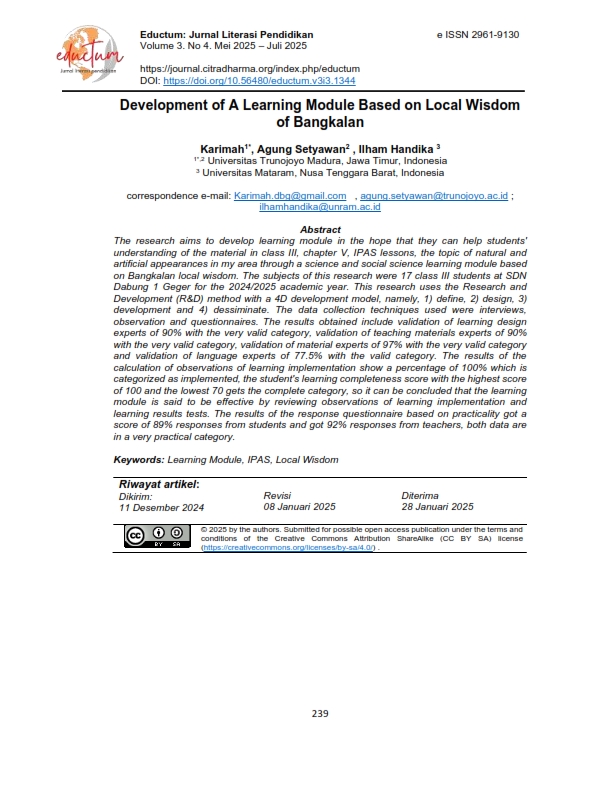Development of A Learning Module Based on Local Wisdom of Bangkalan
DOI:
https://doi.org/10.56480/eductum.v3i4.1344
 Abstrak View:
Abstrak View:
44
 PDF downloads:
PDF downloads:
14
Kata Kunci:
Learning Modul, IPAS, Local WisdomAbstrak
The research aims to develop learning module in the hope that they can help students' understanding of the material in class III, chapter V, IPAS lessons, the topic of natural and artificial appearances in my area through a science and social science learning module based on Bangkalan local wisdom. The subjects of this research were 17 class III students at SDN Dabung 1 Geger for the 2024/2025 academic year. This research uses the Research and Development (R&D) method with a 4D development model, namely, 1) define, 2) design, 3) development and 4) dessiminate. The data collection techniques used were interviews, observation and questionnaires. The results obtained include validation of learning design experts of 90% with the very valid category, validation of teaching materials experts of 90% with the very valid category, validation of material experts of 97% with the very valid category and validation of language experts of 77.5% with the valid category. The results of the calculation of observations of learning implementation show a percentage of 100% which is categorized as implemented, the student's learning completeness score with the highest score of 100 and the lowest 70 gets the complete category, so it can be concluded that the learning module is said to be effective by reviewing observations of learning implementation and learning results tests. The results of the response questionnaire based on practicality got a score of 89% responses from students and got 92% responses from teachers, both data are in a very practical category.
Referensi
Anwar, M. F., Ruminiati , & Suharjo. (2017, Oktober). Pengembangan Modul Pembelajaran Tematik Berbasis Kearifan Lokal Kabupaten Sumenep Kelas IV Subtema Lingkungan Tempat Tinggalku. Jurnal Pendidikan; Teori, Penelitian, dan Pengembangan, 2(10), 1291-1297. https://doi.org/10.53625/jcijurnalcakrawalailmiah.v2i6.5148
Barlian, Ujang Cepi, dan Siti Solekah. “Implementasi Kurikulum Merdeka Dalam Meningkatkan Mutu Pendidikan”. JOEL: Journal of Educational and Language Research 1, no. 12 (2022): 2105–18. https://doi.org/10.58218/literasi.v2i1.492
Farida, Zulaikha , & Putro, H. E. (2020, September). Desentralisasi Wisata Religi Indonesia Melalui City Branding Wisata Kabupaten Bangkalan Madura. Jurnal Magister Ilmu Komunikasi, 6(2), 223-234. https://doi.org/10.30813/bricolage.v6i02.2149
Luzyawati. Lesy. (2017). Analisis Kemampuan Berpikir Kritis Siswa SMA Materi Alat Indera Melalui Model Pembelajaran Inquiry Pictorial Riddle. Universitas Wiralodra. https://doi.org/10.23971/eds.v5i2.732
Masyhudunnuri. (2021). Madrasah Diniyah: Kearifan Lokal dalam Pendidikan Keagamaan di Kabupaten Bangkalan. Jurnal Biokultur , 67-81. https://doi.org/10.20473/bk.v10i1.27798
Mustaghfiroh, Siti. “Konsep merdeka belajar perspektif aliran progresivisme John Dewey”. Jurnal Studi Guru Dan Pembelajaran 3, no. 1 (2020): 141– 47. https://doi.org/10.30605/jsgp.3.1.2020.248
Mubarak, Sobilan, dkk. 2020. Pengembangan Modul Pembelajaran Tematik Melalui Problem Based Learning, Jurnal Instruksional. Vol. 3, No. 1, Hal. 57-65. https://doi.org/10.24853/instruksional.3.1.57-65
Munawaroh, Siti Rossidatul; (2017) Pengembangan Modul Ipa Berbasis Kearifan Lokal Pembuatan Tahu Tamanan Pada Pokok Bahasan Tekanan Dalam Pembelajaran Ipa Di Smpn 1 Tamanan. FKIP UNEJ e-PROCEEDING, 8 dec. 2017. ISSN 2527-5917. https://doi.org/10.19184/jpf.v7i1.7221
Nasir, Muhammad. “Pengembangan kurikulum muatan lokal dalam konteks pendidikan islam di madrasah”. HUNAFA: Jurnal Studia Islamika 10, no. 1 (2013): 1–18. https://doi.org/10.24239/jsi.v10i1.12.1-18
Sihombing, Lisbet Novianti, dkk. 2023. Buku Model Pembelajaran Berbasis Masalah Bermuatan Karakter untuk Meningkatkan Keterampilan Berpikir Kreatif. Bandung: Widina Bhakti Persada. https://doi.org/10.35542/osf.io/hej6x
Siswanto, R. D., & Ninawati, M. (2021). Keefektifan Buku Teks Tematik Berbasis Kearifan Lokal Terhadap Hasil Belajar Siswa Sekolah Dasar. Jurnal Publikasi Pendidikan, 11(1), 36-41. https://doi.org/10.26858/publikan.v11i1.18924
Sugiyono. (2019). Metode Penelitian Kuantitatif, kualitatif dan R&D. (Sutopo, Penyunt.) Bandung: Alfabeta . Sukmadinata, N. S. (2013). Metode Penelitian Pendidikan. Bandung: PT. Remaja Rosdakarya https://doi.org/10.21070/2022/978-623-464-047-2
Suhendra, Odang, dkk. 2020. Journal of Education and Counseling: Pengembangan Modul Berbasis Masalah Pada Materi Sistem Pencernaan Makanan Untuk Meningkatkan Kemampuan Berpikir Kritis Siswa. Vol. 2, No.1, Hal.132 - 149.
Wagiran. (2011). Pengembangan Model Pendidikan Kearifan Lokal dalam Mendukung Visi Pembangunan Provinsi Daerah Istimewa Yogyakarta 2020 (Tahun Kedua). Jurnal Penelitian dan Pengembangan. IV(3). Hlm. 1- 29. https://doi.org/10.47467/reslaj.v6i11.3371

Unduhan
Diterbitkan
Cara Mengutip
Terbitan
Bagian
Lisensi
Hak Cipta (c) 2025 Karimah, Agung Setyawan, Ilham Handika

Artikel ini berlisensiCreative Commons Attribution-ShareAlike 4.0 International License.
Authors who publish with this journal agree to the following terms:
- Authors retain copyright and grant the journal right of first publication with the work simultaneously licensed under a Creative Commons Attribution-ShareAlike 4.0 International License that allows others to share the work with an acknowledgment of the work's authorship and initial publication in this journal.
- Authors are able to enter into separate, additional contractual arrangements for the non-exclusive distribution of the journal's published version of the work (e.g., post it to an institutional repository or publish it in a book), with an acknowledgment of its initial publication in this journal.
- Authors are permitted and encouraged to post their work online (e.g., in institutional repositories or on their website) prior to and during the submission process, as it can lead to productive exchanges, as well as earlier and greater citation of published work (See The Effect of Open Access).

This work is licensed under a Creative Commons Attribution-ShareAlike 4.0 International License.













